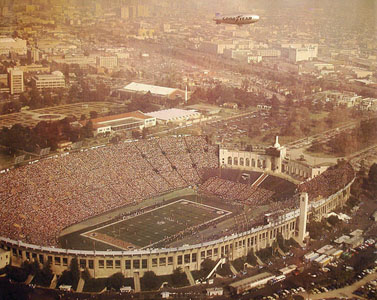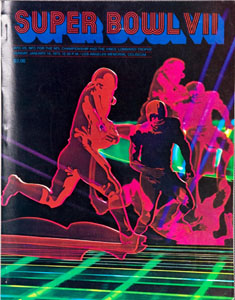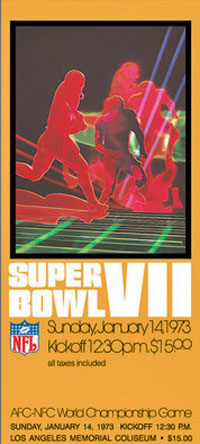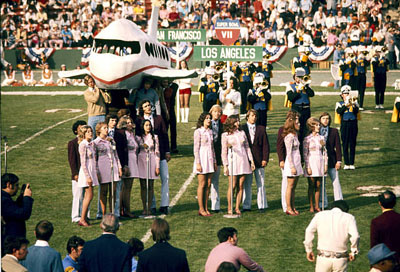1972: Super Bowl VII - Miami Dolphins vs Washington Redskins: Pregame
This series covers the history of the NFL through the prism of its yearly championship games.
Note: The gray boxes contain asides that provide interesting material but could be skipped
without losing the continuity of the article.
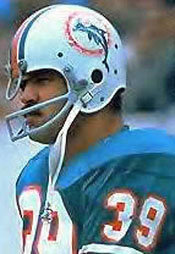
Larry Csonka
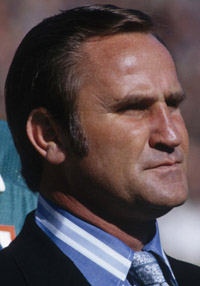
Don Shula
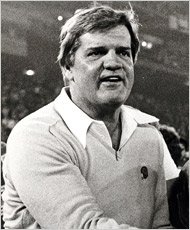
Monte Clark
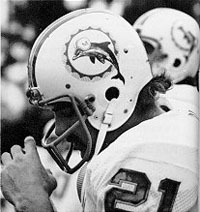
Jim Kiick
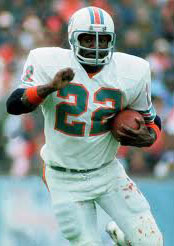
Mercury Morris
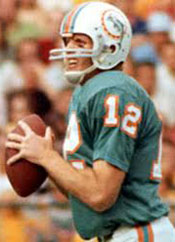
Bob Griese
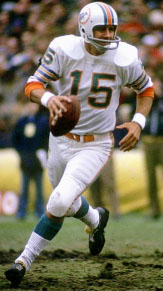
Earl Morrall
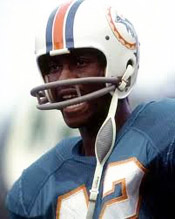
Paul Warfield
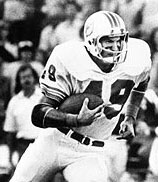
Charlie Babb
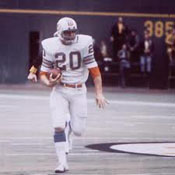
Larry Seiple runs from punt formation
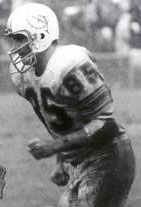
Nick Buoniconti
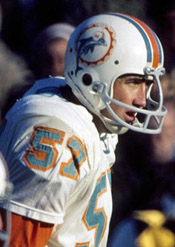
Mike Kolen
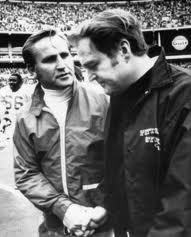
Don Shula and Chuck Noll after AFC Championship Game
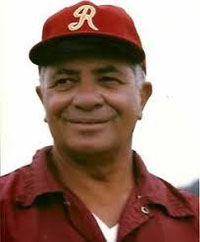
Vince Lombardi
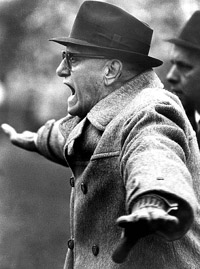
George Halas
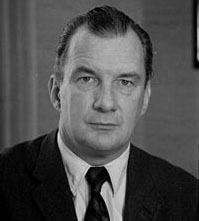
Edward Bennett Williams

George Allen

Sonny Jurgensen
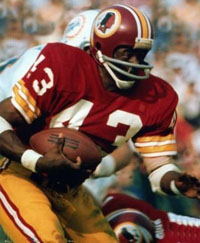
Larry Brown
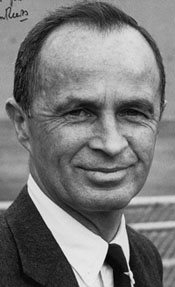
Dan Reeves
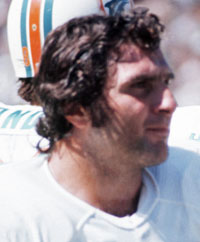
Nick Buoniconti
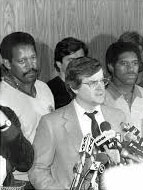
Ed Garvey
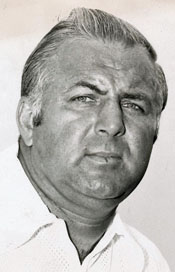
Mike McCormack
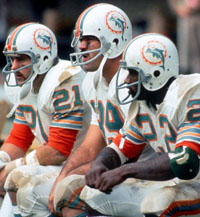
Jim Kiick, Larry Csonka,
Mercury Morris
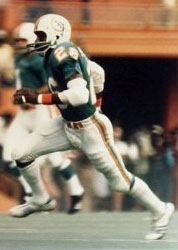
Lloyd Mumphord
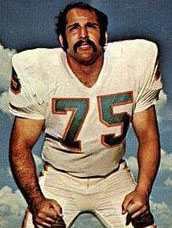
Manny Fernandez
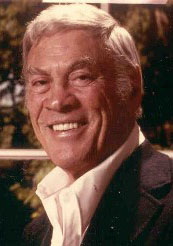
Carroll Rosenbloom
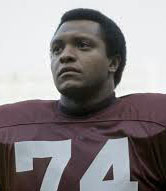
Jim Snowden
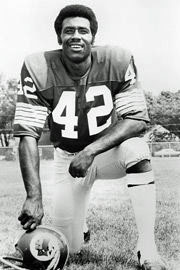
Charley Taylor
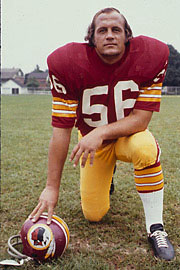
Len Hauss
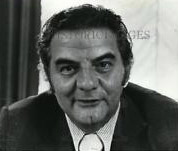
Jimmy "The Greek" Snyder
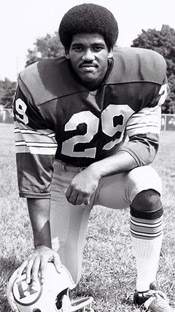
Ted Vactor
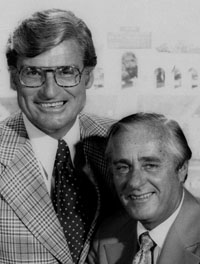
Al DeRogatis and Curt Gowdy
|
The 1972 Miami Dolphins returned essentially same team that lost Super Bowl VI.
- That defeat fueled the team throughout the offseason and training camp as they vowed to get back to the Big Game and win it this time.
The seeds were planted for success in 1972 at a team meeting that Shula held right after the Dolphins lost to the Cowboys 24-3 in Super Bowl VI. Larry Csonka recalled: You can't find a more dismal place in all of sports than the loser's locker room after the Super Bowl. And I will never forget. Coach Shula comes in and runs everyone out who was not directly connected to the operations of the team. He closes the doors and turns to the players, coaches, and staff and says, "I have been here before. I can tell you what is going to happen from here. We are a young, aspiring team. We have a lot on the ball, but we suffered a terrible defeat and one of two things can happen when we go out that door. We can point fingers, blame each other, and fall apart. Or we can stand and weather the storm together to come back and fight another day. The choice is up to you. A house divided won't stand.
To reinforce that point, Shula made his players watch the film of Super Bowl VI twice on the first day of training camp the following summer.
In the words of DE Bill Stanfill, the 1972 Dolphins were a damned determined bunch.
Shula recalled: When you're 0-2 in Super Bowls, they don't say good things about you. One of those things you never want said about you is that you can't win the Big One. And that was what was being said, and the only way to eliminate that is to win.
- The only new O starters would be Wayne Moore at LT and Jim Langer at C, joining LG Bob Kuechenberg, RG Larry Little, and RT Norm Evans.
Four of Miami's O-line starters had been released by other teams. But O-line coach Monte Clark molded them into an effective group. Pete Beathard, the Dolphins' director of player personnel, recalled: Monte did a fabulous job. Larry Little was a hell of an athlete. Those three inside guys were especially good. Wayne was a better athlete than Norm, but Norm was just a real steady RT type. It was a smart, cohesive group.
- LE Vern Den Herder was the lone newcomer on the starting D only because Bob Heinz, moved from T to E, had fractured a vertebra in his back in an exhibition game and was lost for two months and, two days later, the starting DE, Jim Riley, went out for the season with torn knee ligaments.
- Tex Maule of Sports Illustrated, the nation's premiere pro football writer, didn't think the Dolphins would even win their division.
It is unreasonable to expect that the Miami Dolphins again will enjoy the kind of success that, apart from mid-January, they experienced last season. Oh, Don Shula's club should make the playoffs for a third consecutive year, but for the team to prevail as before - without suffering one injury serious enough to revise a three-deep list - begs much of logic and more of fate. ...
The heart of the offense is the NFL's best rushing attack, led by Larry Csonka and his all-purpose buddy, Jim Kiick, who combined for 1,789 yards, 10 touchdowns and a single fumble in 357 carries. Breakaway back Mercury Morris, who led the AFC in kickoff returns, did not get into the act often enough to suit his pride and has hectored Shula for more work.
But the man who makes Miami move is Griese, a quarterback who brings more cool detachment to the game than his 27 years normally acquire. Sure-handed, intelligent and a scrambler when the need arises, Griese was the NFL's second-ranking passer in '71 with 2,089 yard, 19 touchdowns and but nine interceptions. Now he plans to improve.
- Maule's preview gave an excellent summary of the Dolphins' strengths. He was right in predicting that they could not go another season without major injury. In fact, they would suffer an injury at the position that would hurt the most.
The Dolphins' season started with a "trap game."
- With a flair for the dramatic, the NFL schedule makers sent Miami to Kansas City for the first game in new Arrowhead Stadium in a rematch of the Christmas Day playoff game the year before when the Dolphins prevailed in the longest game in pro football history. The Chiefs were determined to show that they were the better team and could have done what the Dolphins failed to do - beat the Cowboys in Super Bowl VI. But unseasonably hot weather wilted the Chiefs, and Miami cruised to a 20-10 victory.
- After a 34-13 romp over the Houston Oilers, the Dolphins won a come-from-behind squeaker over the Vikings in Minnesota to become the last undefeated team in the league after just three weeks.
- Disaster struck the next week against the Chargers. Early in the game, Griese was knocked out of the game with a dislocated right ankle and fractured right fibula. 38-year-old Earl Morrall moved under C and directed the 24-10 victory.
Stanfill recalled: When Bob went down, I walked over to Earl and said, "Hey, old man, turn up that hearin' aid, buy ya' a bottle of Geritol, and let's get goin'!
- If any team could survive the loss of its QB for at least two months, it was a team like the Dolphins with an outstanding defense and excellent running game.
- In Week 6, Miami committed four turnovers and incurred eleven penalties and still won - just barely - over Buffalo 24-23. The Killer B's shut down RB O. J. Simpson. It seemed that every week, a different Dolphin made a key play.
- Three comparatively easy wins followed under Morrall's leadership. The third one, a 52-0 rout of the New England Patriots, provided Shula with his 100th NFL victory.
- The following week's game against the New York Jets in the Orange Bowl held extra drama. First, the Dolphins could clinch the AFC East with a win and, secondly, the opposing QBs had faced each other in Super Bowl III. The Jets led 17-14 at halftime but the No-Name Defense held Joe Namath & Company to seven points the last 30 minutes to help pull out a 28-24 victory.
Shula: Our defenders liked the fact that they had been labeled the "No-Name" defense, but they were far from unknown to the rest of the league. ... The teams we faced knew exactly who they were and what they could do.
- As talk of Miami completing the season undefeated intensified around the league, the Dolphins got to showcase their skills on Monday Night Football. The 2-7-1 St. Louis Cardinals weren't expected to give the Dolphins much trouble, and they didn't. Miami jumped on top right away and coasted to a 31-10 victory.
- Since teams were not seeded in the playoffs based on their records, Shula was asked if he would start resting his starters now that the division title was in hand. Don replied that his players wouldn't go along with that idea. Another reporter asked Shula, Would you rather lose this week and take the pressure off the postseason or keep winning and have the pressure build? Shula answered: Before I throw you out of the press conference, can you tell me why we have to lose at all?
- The Patriots played better in the return match in New England but still fell 37-21. Another trip north the following week brought a 23-13 triumph over the Giants.
- That left only the Baltimore Colts standing in the way of the first 16-0 season in NFL history. Miami fans packed the Orange Bowl seeking the answer to an additional question: Would Bob Griese get some playing time before the postseason? The Baltimore defense played well, but you can't win if you can't score. Leading 16-0 in Q4, Shula sent in Griese to the delight of the crowd.
- Miami led the NFL in both total offense and total defense. Their 2,960y on the ground erased a 36-year-old NFL record.
Would Shula continue with Morrall in the playoffs or reinstate Griese?
- After the Colts game, a reporter asked Griese if he would like to start next week. I would like to start every week. But I'm not completely healthy yet and Earl Morrall is. What if you get healthy? the reporter replied. I think the chances are that Earl will start in the playoffs no matter what.
- The Cleveland Browns earned a wild card berth thanks to their 10-3 record. Needing to start fast, they did just the opposite. Dolphins rookie Charlie Babb blocked Cleveland's first punt and ran it into the EZ for a 7-0 lead. Miami's next possession resulted in a Garo Yepremian FG to make it 10-0. The Browns' young QB Mike Phipps threw three INTs in Q1 alone, but his defense, and shaky play by Morrall, kept the Dolphins from adding to their lead.
- Cleveland finally got on the scoreboard in Q3. Then, as the Miami offense continued to flounder, the Browns shocked the sunshine-drenched crowd by taking the lead 14-13 with 8:11 to go. On Miami's next possession, Morrall went to the teammate who most wanted to beat the Browns, his former team - WR Paul Warfield. Shut out all day, he caught a down-and-out for 15y. Several plays later, Morrall tossed a long one that the graceful receiver juggled but held onto for a 32y gain to the 20. Cleveland committed interference on Paul on the next pass to move the pigskin to the 8. Jim Kiick slashed over from there. An INT in the last minute sealed the 20-14 win.
Despite their undefeated record, the Dolphins had to travel to Pittsburgh for the AFC Championship Game.
- The Steelers were sky high after their dramatic last second victory over Oakland on Franco Harris's "Immaculate Reception" and ready to win the franchise's first conference championship. The team from sunny Florida got a break when game day brought 60° weather.
- Pittsburgh jumped in front 7-0 in Q1. The Dolphins couldn't penetrate the Steel Curtain defense until one of their special teams made a big play. Facing 4th-and-5 at the Steeler 49, Larry Seiple went back in punt formation. When he saw exactly what he had seen on film - black jerseys running away from him after the snap - he scampered 37y. Two plays later, Morrall flipped 9y to FB Larry Csonka for the tying TD.
- Shula decided to go with Griese the second half. After the Steelers took a 10-7 lead early in Q3, Bob connected with Warfield on a quick slant for 52y to set up Kiick's 2y TD to give the visitors their first lead of the day, 14-10. After blocking a FG a few minutes later, the Dolphins took over at midfield and forged an 11-point lead with seven minutes left on another run by Kiick.
- Pitt coach Chuck Noll reinserted his starter, Terry Bradshaw, whom he had pulled midway through the first half. Rejuvenated, the Steelers stormed to a TD in less than three minutes. Then the defense forced a three-and-out as the crowd went wild, anticipating another miracle finish. But MLB Nick Buoniconti intercepted Bradshaw, and the Miami running game ate up ground until turning the ball over on downs with 42 seconds left. Another INT, this one by LB Mike Kolen, ended Pittsburgh's season and sent the Dolphins to their second straight Super Bowl.
Read the complete story of the Dolphins' 1972 season.
The Washington Redskins, one of the top franchises in the NFL in the late 1930s and the 1940s, fell on hard times in the 1950s.
- Going into the 1971 season, the Redskins had produced just one winning season since 1955. That came the one year that Vince Lombardi coached the team in 1969 before dying of cancer.
- Edward Bennett Williams, a minority stockholder of the team who ran the franchise for majority stockholder Jack Kent Cooke, who lived in Los Angeles, hired George Allen as coach for the 1971 season. Allen had been the defensive coordinator for the George Halas's 1963 Chicago Bears team that won the NFL Championship. Allen coached the Los Angeles Rams from 1966-70, compiling a record of 40-13-1. But a power clash and playoff losses cost him his job.
Allen hated rookies, preferring to stock his team with veterans obtained by trading draft choices.
- George made 19 trades and gave up 24 draft picks. Eight of the players who joined Washington via trades came from his former team, the Rams.
Allen acquired so many expensive veterans that Edward Bennett Williams complained, I gave George an unlimited budget, and he exceeded it.
Allen's reputation for doing anything to win was illustrated by the fact that he traded the same third-round pick to two different teams in 1971 for DT Ron McDole and return specialist Speedy Duncan. The league office didn't catch the double-dealing until draft day approached the following spring. With some owners wanting Allen expelled, Commissioner Rozelle fined Washington the maximum $5,000.
Pete admitted it wasn't the first time George had pulled this trick. We batted 1-for-3. We blocked one such transaction.
- Half the starting lineup of his '71 Redskins were 30 or older, including 32-year-old QB Billy Kilmer. He was a clever and fiery leader who fit Allen's ball-control defense despite not throwing the prettiest passes in the league.
- Two veterans were the leaders of the savvy defense. Both LB Jack Pardee and S Richie Petitbon had played for Allen in Chicago.
When Allen died in 1990, his most famous line was etched on his tombstone: The future is now.
- The only Redskin to make the Pro Bowl was RB Larry Brown, who gained 948y. Allen had inherited Brown from Bill Austin, who replaced Lombardi for the 1970 season. That was the year Brown catapulted to fame in the NFL, leading the league with 1125y, which made him the first Redskin to surpass 1000y, and 86.5 yards/game. He had broken the 1000 mark again in '72 with 1216 and led the league in yards/game at 101.3. He also topped the NFL with 1689 yards from scrimmage.
- Yet Washington improved from 6-8 in 1970 to 9-4-1 in Allen's first year. Included was a 20-16 upset of the Cowboys, the eventual Super Bowl champs. The Redskins made the playoffs as a wild card - the franchise's first appearance in the postseason since 1945 - but lost to San Francisco 24-20 to continue Allen's dubious distinction of never having won a playoff game as head coach.
The '72 Skins had three new starters on offense and the same number on defense.
- Roy Jefferson replaced Boyd Dowler at WR, Terry Hermeling replaced Jim Snowden at LG, and Paul Laaveg took over for Ray Schoenke at LG.
- On defense, the changes were: Bill Brundige for Manny Sistrunk at LT, Harold McLinton for Myron Pottios at MLB, and Rosey Taylor for Richie Petitbon at S.
- Washington started strong, winning 11 of their first 12 games, including a 24-20 home victory over the defending champion Cowboys.
- Along the way, Allen made changes at QB. After losing Game 3 against New England, he replaced Kilmer, who had led his team to the playoffs the season before, with 38-year-old Sonny Jurgensen to the delight of the Washington fans, whom Sonny had thrilled since 1964. He started four games, winning them all, but suffered a torn achilles that ended his season. So Kilmer resumed his role under C.
- Momentum heading into the playoffs was blunted by two defeats to end the regular season at Dallas and at home against Buffalo. But the Redskins still won their division for the first time in 27 years.
The Redskins had come close to an undefeated season themselves. In the 24-23 loss to New England, Allen took three points off the board after a penalty only to have K Curt Knight miss the subsequent FG from closer in. Then he rested Brown, the NFL's MVP, in the final two games, both losses.
Allen's defense dominated the two playoff games.
- First the Packers, then the defending NFL-champion Cowboys, scored only 3 points at RFK Stadium.
- In both cases, the Redskins thwarted the opponent's running game.
--Green Bay gained just 78y on 29 carries.
--Dallas rushed for 96y on 21 carries.
Super Bowl VII promised to be the lowest scoring contest in the game's history.
- The two teams reflected their coaches, who both had defensive backgrounds.
- The Redskins finished 4th best in the league in yards allowed (3523) while the Dolphins ranked 5th (3661).
- Miami ranked third in points allowed (174) with the Redskins right behind them in 4th (190).
- The Dolphins, however, were the better team offensively.
| Yards Gained |
Points Scored |
4. Miami 4412
12. Washington 4030 |
4. Miami 315
12. Washington 276 |
There was no question as to who was the Redskins' #1 fan.
- President Richard Nixon had called Don Shula the week of Super Bowl VI to offer encouragement.
- However, the Commander-in-Chief's favorite team was the Redskins. I always root for the home team, he explained, and my home now is in Washington. He had met the Washington coach in 1951 when Allen was the coach at Whittier College, Nixon's alma mater in California where he had been a reserve on the football team. Their friendship continued when Allen was coach of the Rams.
- So the president was delighted when Allen became the Redskins' coach. Nixon told the press corps, I am betting on the Redskins for the championship in either 1971 or 1972.
- The two spoke on the phone often. After the Skins lost two games in a row in '71, the president came to the practice field in a helicopter at Allen's request for a surprise pep talk for the players. George even let Nixon call a play during practice.
Nixon called Allen as the Redskins prepared for their 1971 playoff game against San Francisco. The president suggested the reverse play he had called at the practice earlier in the season. When Allen called the play at the end of Q2 in the game, QB Billy Kilmer, who had been present when Allen took Nixon's call, assumed his coach was following the president's suggestion. The results was a 13y loss. One TV announcer quipped, That must have been a play Richard Nixon called in to George Allen. The press soon found out about the phone call and turned it into a legendary story. Allen neither confirmed nor denied that he called the play Nixon suggested. But Marv Levy, future coach of the Bills' Super Bowl teams who was the Washington special teams coach (the only one in the league, according to Levy) later said that George had fed the play to Nixon and told the president to call him so it would seem like Allen was taking the play from the president.
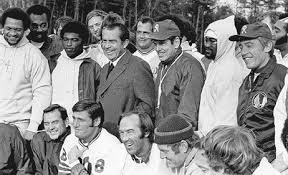
President Nixon at Redskins' practice; Marv Levy is at the far right, two people away from George Allen.
Both teams traveled across the country to sunny California the Sunday before the game.
- Unlike the previous Super Bowl, which was held in geographically compact New Orleans, SB VII in sprawling Los Angeles had no hub.
- The game would be at Memorial Coliseum. The media was in Newport Beach. The Redskins were headquartered in Santa Ana. The Dolphins stayed in Long Beach.
- Shula loved the venue. No distractions this time. The quietest Super Bowl yet, proclaimed the Los Angeles Times.
The Dolphins were assigned the Rams' facility as their practice home for the week. Shula liked the good locker rooms and spacious meeting space. But he didn't like the fact that a school across the street overlooked the field. Since Allen had a reputation for spying on opponents' practices, Shula found a more secure practice field at a local community college. Each day, the Dolphins bused from the hotel to the Rams facility where they changed in the lockers. Then they re-boarded the bus for the practice field, where two Dolphins employees inspected the trees each day for spies.
Allen returned in triumph to the city he had been run out of two years earlier.
- It doesn't do any good to come to the Super Bowl if you don't win, said George when he arrived. He refused to comment on questions about whether he was seeking vindication or revenge. All he said was, We have a lot of friends in California.
Allen had made a number of enemies in his NFL coaching career, including George Halas of the Bears and Dan Reeves, owner of the Rams. When Allen broke his contract with the Bears in 1966 to take the Rams job, Halas sued him, won in court, then withdrew the suit and fired him. In a farewell tirade, George labeled Allen a cheat, a liar, an opportunist, and a man lacking in character. Five seasons later, Reeves fired Allen for lying and spending lavishly.
But George had been a winner. His .730 winning percentage in seven years as a head coach was second in the league only to Shula's .768 for ten seasons.
- The starters for Allen's "Over-the-Hill Gang" averaged 30.9 years old. By contrast, Nick Buoniconti was the only Miami starter over 30.
- Shula, a two-time Super Bowl loser, said he was "most proud" of the Dolphins' unprecedented 16-0 record but added, It will become a failure if we don't make it 17-0 with a world championship.
Shula recalled: It was hard to ignore the fact that every time you heard the name "Dolphins" people would label us "losers" and "chokers."
- Commentators remarked on the similarities between the two coaches. Both had backgrounds on the defensive side of the ball. Both were beloved by their fans for turning their franchises around. Both were all business, perfectionists who drove their teams hard. Both stressed the ground game, ball control, and play action passes.
One area where Allen and Shula differed was in length of practices. Shula, as a disciple of Paul Brown, didn't believe in long practices with lots of hitting once the season started. Allen refused to believe Miami's practices never ran more than an hour 45 minutes and often were shorter. Raiders coach John Madden, when he learned about Shula's practices from a Dolphin at the Pro Bowl, said, You can't have that kind of execution practicing that little.
- Despite their undefeated season, the Dolphins were two-point underdogs according to the oddsmakers, who were still convinced the NFC was the better conference. Allen was not happy about his team being favored. They haven't lost a game all year, yet we're the favorite.
A discordant note was sounded by Ed Garvey, Executive Director of the NFL Players Association, after a meeting in Los Angeles of the 28 team representatives Monday to discuss grievances. Unless there is a dramatic change in the attitude of the owners, the National Football League players will stage a strike to start the 1973 season. The players said they are concerned about injuries on artificial surfaces and other issues. Talks with owners will begin next week, and the players will hold a convention in Las Vegas June 3-7.
Naturally, the QBs and RBs were prime targets for reporters.
- Kilmer on the Dolphins' defense: They don't make mistakes, and they make you throw to areas where they can react. They don't let you put a great receiver like Charley Taylor in a man for man situation.
- Larry Brown was asked if he wanted to surpass the records of another Brown, legendary Jim of Cleveland. Larry replied, I'm not trying to prove anything. I just want to help Washington win. Redskins O-line coach Mike McCormick, who played T in front of Jim Brown for six years with Cleveland, paid Larry a great compliment. I don't think anyone has a bigger heart than Larry Brown. I remember against Dallas, he took a short pass, looked at the marker on the sideline, then surged and got the first down. Jim Brown had that same knowledge of the sticks. Like Jim did, Larry goes for the first down.
- The biggest question for Miami was which QB would start. Shula had called both Griese and Morrall into private conferences before announcing that Bob would start. You don't play games with men the caliber of Griese and Morrall. I explained to them why I decided what I did. As a team, I believe we are stronger with a healthy Griese starting and with Earl available if we need him.
Don praised Morrall. It was a difficult because Earl is such a first-class person on and off the field. We wouldn't be standing here today, preparing for the Super Bowl, if it were not for Morrall. He picked us up in our darkest moment. Thinking back to Earl's performance for his Colts in 1968, Don explained, He's won a lot of games for me. Matter of fact, my long memory is what caused Morrall to be retained when we cut our roster to 40 regulars last summer.
As soon as Morrall walked into Shula's office and saw his face, Earl knew he would get bad news.
I want to play just as much as he does, Morrall said.
I know, Shula replied.
I feel I've contributed, and I still want to contribute, said Earl.
We need you to prepare to play like you always do, Shula ordered.
I won't make waves or anything, Earl promised. I've seen how that works. The biggest thing we all want is to win the final game.
Don would later rank this as the hardest decision of his coaching career.
- Griese: Our achievement this year is not in making the Super Bowl, but it will be in winning. Asked what he thought of George Allen, Bob replied: I'm only concerned with what Don Shula says. He gets our problems out in the open among us. He's always wrapped up emotionally, but he stresses getting ready for a game is an individual thing. Griese expected the Redskins to try to stop Miami's running game. The Dolphin QB added that his arm felt better than the year before because he hadn't played as much. His ankle still swelled, but it didn't hurt in a game. He could scramble with it and do what he needed.
- Morrall had started nine of Miami's victories. Sure I wish I could start, and I would like to feel I have earned a chance to start, but I can't sit there and brood. I've got to get myself mentally ready in case I have to go in there again should something happen to Bob again.
- Larry Csonka was fed up with people trying to create a feud between Mercury Morris and Jim Kiick, his running partners in the Miami backfield. They love each other; they pull for each other. They just hate to ride the bench.
Shula had been criticized even by his own players for not using the speedy Morris more against Dallas in Super Bowl VI. In '72, Mercury gained almost twice as many yards as Kiick - 1000 to 521.
One player made comments to the media that caused his coach to wince.
- Lloyd Mumphord had replaced Tim Foley at CB for Miami when Foley got hurt in Game 13. Lloyd was asked if he could cover Washington's star receiver Charley Taylor. Taylor never made any big plays off me the first times I've faced him. I've never had any trouble with their receivers. I like the way Kilmer throws the ball. He doesn't throw with much zip, but he tries to throw it in there anyway. That gives you a pretty good chance to come down with one. The Dolphin coaches worried about what Mumphord said, not because he was wrong about Kilmer but because he was right. The defensive game plan called for enticing Billy to throw deep.
- When asked about Mumphord's comments, Shula replied, What did you expect him to say? "I'm scared to death?" My players can say anything they want to. It was just an honest response.
- Kilmer asked, So he likes to catch my passes? If he really likes it enough, maybe he ought to try out for our team next year as a wide receiver.
The two coaches presented different styles of handling the media.
- Some questions revealed Shula's sense of humor. Asked if he would prohibit players from having sex before the game, Don chuckled and said, How would I enforce that?
The Miami coach had solved or at least lessened that sensitive problem by having the wives stay at the Beverly Hills Hilton, nearly an hour away from the team hotel.
Asked if he was aware that the Redskins had not lost a game in the rain that season, he smiled. If it rains Sunday, we're going to forfeit.
Asked if he was filming Dolphins practices, Shula grinned and made reporters laugh when he said, We'll let George film them.
- Allen, on the other hand, didn't hide the fact that he considered the obligatory press conferences nothing but distractions. On Wednesday, he started by complaining that he was missing my first team meeting in 23 years.
The next day, he said, We had 31 players in interviews for one and one-half hours, and we had our worst practice of the week.
On Friday, a reporter asked George, Aren't you sounding like a loser?
He snapped, I'm not thinking like one. Is there anything else?
Do you want to leave, George?
You guys wrecked our practices. At least let me get to my meeting.
Thank you, Mr. President.
- If Shula seemed to be winner of the media relations game, he had done it by putting up a false front. First, he was sick all week with the flu, going to bed each night by 9 PM but not sleeping well. Don felt more pressure than for any game he had ever coached. Even though he didn't share any of this with his players, they could read him like a book. Neurotic, though Csonka. Absolutely crazy was Manny Fernandez's take. I've never seen Shula as uptight as this, confided TE Jim Mandich to a Miami Herald reporter. My God, can you imagine what life with Shula would be like if he lost another Super Bowl?
Colts owner Carroll Rosenbloom didn't help matters with his comments. He had never forgiven Shula for negotiating with Miami while still under contract to Baltimore - a move that caused Rozelle to give Miami's first pick in the 1971 draft to the Colts. Rosenbloom told reporters on Thursday, I've seen him freeze up in the big ones. Carroll also lumped Shula in with the widely discredited Allen. These are two coaches who broke all the rules in football. Shula was so upset he phoned Rozelle. You've got to put an end to this (Rosenbloom's vendetta). Worrywart Shula would get no sleep at all the night before the game.
As the week went on, word began to spread that the veteran Redskins squad chafed under Allen's tight grip.
- Practices were long, and meetings were longer. Allen imposed a curfew every night whereas Shula gave the Dolphins the first three nights off.
- With two weeks to prepare for the Super Bowl, the ultra-paranoid Allen agonized over minutiae. For example, he had return men experiment with sunglasses and ordered someone to chart the sun's afternoon angles in Memorial Coliseum.
- On Tuesday night, Jim Snowden, an OT on the injured list, missed curfew. Allen wanted to send him home to set an example. But the team's black players persuaded Taylor, a team captain, to circulate a petition saying that, if Snowden were sent home, the black players wouldn't play the game. Taylor and another captain, Len Hauss, met with George and talked him out of punishing Snowden.
By contrast, the Dolphins had done something to help relax their team and especially their coach. The week before flying to Los Angeles, Csonka and Fernandez had an idea. Nick Buoniconti told the story at the 25th anniversary of the 1972 Dolphins.
They went fishing and caught a little 3-foot alligator. Manny brought it home and now he and Zonk said, "Let's put it in Shula's shower." After practice the next day, while Shula is talking to the media, Manny sprints to his car - he never sprinted off the practice field before - grabs the alligator out of the trunk, runs in and tosses it in Shula's private shower.
Now we're all in the locker room, waiting and listening. Finally, we hear Shula shriek, "Monte, Monte" - the alligator's tail must've whipped him. We hear him run through his secretary's office to the assistant coaches' room and tell Monte Clark: "There's an alligator in my shower. Get it out of there."
Monte said, "Don, that's not in my job description." Our equipment man, Danny Dowe, had to get it. The next day, Shula is in the middle of the locker room, saying, "All right, who did it?" Finally Zonk raises his hand. Shula says, "You did it?" Zonk says, "Yeah, but you won by one vote." Shula says, "Vote for what?" Zonk says: "To tape the alligator's mouth. You won by one vote." With that, Shula breaks up, then we all did. It really loosened everybody up.
On the other sides, the Dolphins resented their role as undefeated underdogs.
- They couldn't understand why the nation's foremost oddsmaker, Jimmy "The Greek" Snyder, had raised Washington from a 2- to a 3-point favorite. He cited Jake Scott's shoulder injury and his belief that the Redskins were the "tougher" team.
Picking Scott as an example of the Dolphins' lack of toughness was particularly irksome. True, he hadn't practiced in two weeks because of a sprained shoulder, but he had played in Super Bowl VI with two broken hands. He told reporters, I will play with a lot of dope.
Shula remembered that he liked being the underdog. That put some pressure on them and took some of the edge off us trying to complete our season undefeated.
Kuechenberg recalled: We have the only undefeated season in the NFL in 40 years with a large input from our second-string QB leading us to eleven wins. ... The Redskins lost three games. And we beat all three of those teams (actually two of the three). We were indignant.
- One Dolphin who didn't let the outside noise bother him was Bob Griese. Studying films of the Redskins' defense, he had been astounded by what he saw. They never altered their schemes, always using man-to-man coverage on third-and short and zone defense on third-and-long. They always deployed their nickel back, Ted Vactor, the same way. The more film he watched, the more he became convinced that the Dolphins' strengths would work well against the Washington's strengths. He was confident their defensive front couldn't stop his running game and their outside LBs weren't quick enough to cover his short passes.
As the game approached, Bob chuckled to himself that he should guarantee victory the way Joe Namath did for Super Bowl III. If anything, he had to restrain himself from becoming overconfident.
- Arnsparger's defensive game plan focused on stopping Brown. The Dolphins weren't worried about Kilmer, an all-time competitor who didn't have a whole lot of talent.
Beathard: We were a younger, faster team. ... everybody on defense was always in the right place at the right time. Arnsparger did such a great job preparing those guys. Buonoconti once told me that it was almost eerie when Arns called the defense because it was like he knew what the play was going to be ... He said it was a great feeling to have someone like Arnsparger there.
The Super Bowl had grown in importance in the six years since the first game was held in Los Angeles.
- Super Bowl I drew just 61,946 in the same stadium that would seat 90,182 for Super Bowl VII.
- Tickets to the first game cost $12 and were scalped for $6 an hour before kickoff. SB VII's $12 tickets sold out well in advance. A scalper admitted buying tickets for $30 and selling them for $40 apiece.
- With the wisdom of Solomon, Pete Rozelle split the SB I television baby between CBS and NBC, allowing both to televise the game. After that, the two networks alternated coverage.
- A 30-second commercial for SB VII sold for a record $100,000. Similar ads for the first Super Bowl cost $37,500-42,500.
Super Bowl VII was the first to be telecast live in the host city.
- The NFL allowed the game to be telecast in the Los Angeles area as an experiment when all tickets were sold.
- Curt Gowdy did the play-by-play with color commentary by Al DeRogatis for NBC.
- Jim Simpson and Kyle Rote handled the radio broadcast, also on NBC.
The pregame show featured the Michigan Marching Band and the crew of Apollo 17 who had returned from the Moon a month earlier. |
1972 Miami Dolphins
| # |
Player |
Pos. |
Hgt. |
Wgt. |
College |
Exp. |
| 1 |
Garo Yepremian |
K |
5-8 |
175 |
None |
7 |
| 12 |
Bob Griese |
QB |
6-1 |
190 |
Purdue |
6 |
| 13 |
Jake Scott |
FS |
6-0 |
188 |
Georgia |
3 |
| 15 |
Earl Morrall |
QB |
6-1 |
205 |
Michigan State |
16 |
| 20 |
Larry Seiple |
P |
6-0 |
215 |
Kentucky |
6 |
| 21 |
Jim Kiick |
RB |
5-11 |
215 |
Wyoming |
5 |
| 22 |
Mercury Morris |
RB |
5-10 |
190 |
West Texas A&M |
4 |
| 23 |
Charlie Leigh |
PR |
5-11 |
206 |
None |
5 |
| 26 |
Lloyd Mumphord |
CB |
5-10 |
175 |
Texas Southern |
4 |
| 28 |
Ed Jenkins |
RB |
6-2 |
210 |
Holy Cross |
1 |
| 32 |
Hubert Ginn |
RB |
5-10 |
185 |
Florida A&M |
3 |
| 39 |
Larry Csonka |
FB |
6-3 |
235 |
Syracuse |
5 |
| 40 |
Dick Anderson |
SS |
6-2 |
195 |
Colorado |
5 |
| 42 |
Paul Warfield |
WR |
6-0 |
190 |
Ohio State |
9 |
| 45 |
Curtis Johnson |
CB |
6-1 |
195 |
Toledo |
3 |
| 47 |
Henry Stuckey |
CB |
6-1 |
180 |
Missouri |
1 |
| 49 |
Charlie Babb |
DB |
6-0 |
190 |
Memphis |
1 |
| 51 |
Larry Ball |
LB |
6-6 |
230 |
Louisville |
1 |
| 53 |
Bob Matheson |
LB |
6-4 |
240 |
Duke |
6 |
| 54 |
Howard Kindig |
G-C |
6-6 |
265 |
Los Angeles State |
8 |
| 56 |
Jesse Powell |
LB |
6-2 |
220 |
West Texas A&M |
4 |
| 57 |
Mike Kolen |
LB |
6-2 |
220 |
Auburn |
3 |
| 59 |
Doug Swift |
LB |
6-3 |
225 |
Amherst |
3 |
| 62 |
Jim Langer |
OL |
6-2 |
250 |
South Dakota State |
3 |
| 65 |
Maulty Moore |
DT |
6-5 |
265 |
Bethune-Cookman |
1 |
| 66 |
Larry Little |
G |
6-1 |
265 |
Bethune-Cookman |
6 |
| 67 |
Bob Kuechenberg |
G |
6-2 |
255 |
Notre Dame |
3 |
| 72 |
Bob Heinz |
DT |
6-6 |
265 |
Pacific |
4 |
| 73 |
Norm Evans |
T |
6-5 |
250 |
TCU |
8 |
| 75 |
Manny Fernandez |
DT |
6-2 |
250 |
Utah |
5 |
| 77 |
Doug Crusan |
T |
6-5 |
250 |
Indiana |
5 |
| 79 |
Wayne Moore |
T |
6-6 |
265 |
Lamar |
3 |
| 80 |
Marv Fleming |
TE |
6-4 |
230 |
Utah |
10 |
| 81 |
Howard Twilley |
WR |
5-10 |
185 |
Tulsa |
7 |
| 82 |
Otto Stowe |
WR |
6-2 |
190 |
Iowa State |
2 |
| 83 |
Vern Den Herder |
DE |
6-6 |
250 |
Central College (IA) |
2 |
| 84 |
Bill Stanfill |
DE |
6-5 |
250 |
Georgia |
4 |
| 85 |
Nick Buoniconti |
LB |
5-11 |
220 |
Notre Dame |
11 |
| 86 |
Marlin Briscoe |
WR |
5-11 |
180 |
Nebraska-Omaha |
5 |
| 88 |
Jim Mandich |
TE |
6-2 |
225 |
Michigan |
3 |
|
1972 Washington Redskins
| # |
Player |
Pos. |
Hgt. |
Wgt. |
College |
Exp. |
| 4 |
Mike Bragg |
P |
5-11 |
185 |
Richmond |
5 |
| 5 |
Curt Knight |
K |
6-2 |
190 |
N. Texas/Texas/CGA |
4 |
| 13 |
Alvin Haymond |
CB |
6-0 |
195 |
Southern |
9 |
| 17 |
Billy Kilmer |
QB |
6-0 |
205 |
UCLA |
12 |
| 18 |
Sam Wyche |
QB |
6-4 |
220 |
Furman |
5 |
| 22 |
Roosevelt Taylor |
FS |
5-11 |
185 |
Grambling State |
12 |
| 23 |
Brig Owens |
SS |
5-11 |
190 |
Cincinnati |
7 |
| 25 |
Mike Hull |
RB |
6-3 |
220 |
USC |
5 |
| 26 |
Bob Brunet |
RB |
6-1 |
205 |
Louisiana Tech |
5 |
| 28 |
Herb Mul-Key |
RB |
6-0 |
190 |
None |
1 |
| 29 |
Ted Vactor |
DB |
6-0 |
185 |
Nebraska |
4 |
| 31 |
Charley Harraway |
RB |
6-2 |
215 |
San Jose State |
7 |
| 32 |
Jack Pardee |
LB |
6-2 |
225 |
Texas A&M |
16 |
| 37 |
Pat Fischer |
CB |
5-9 |
170 |
Nebraska |
12 |
| 41 |
Mike Bass |
CB |
6-0 |
190 |
Michigan |
6 |
| 42 |
Charley Taylor |
WR |
6-3 |
210 |
Arizona State |
9 |
| 43 |
Larry Brown |
RB |
5-11 |
195 |
Kansas State |
4 |
| 44 |
Jeff Severson |
CB |
6-1 |
185 |
Long Beach State |
1 |
| 48 |
John Jaqua |
S |
6-0 |
190 |
Lewis & Clark |
3 |
| 53 |
Harold McLinton |
LB |
6-2 |
235 |
Southern |
4 |
| 55 |
Chris Hanburger |
LB |
6-2 |
220 |
North Carolina |
8 |
| 56 |
Len Hauss |
C |
6-2 |
235 |
Georgia |
9 |
| 58 |
George Burman |
C |
6-3 |
255 |
Northwestern |
9 |
| 60 |
John Wilbur |
G |
6-3 |
250 |
Stanford |
7 |
| 62 |
Ray Schoenke |
G |
6-4 |
250 |
SMU |
10 |
| 64 |
Manny Sistrunk |
DT |
6-5 |
270 |
Arkansas-Pine Bluff |
3 |
| 66 |
Myron Pottios |
LB |
6-2 |
230 |
Notre Dame |
12 |
| 67 |
Rusty Tillman |
LB |
6-2 |
230 |
Arizona, No. Arizona |
3 |
| 68 |
Mike Fanucci |
DE |
6-4 |
235 |
Arizona State |
1 |
| 72 |
Diron Talbert |
DT |
6-5 |
255 |
Texas |
6 |
| 73 |
Paul Laaveg |
G |
6-4 |
245 |
Iowa |
3 |
| 75 |
Terry Hermeling |
T |
6-5 |
255 |
Nevada |
3 |
| 76 |
Walter Rock |
T |
6-5 |
255 |
Maryland |
10 |
| 77 |
Bill Brundige |
DT |
6-5 |
270 |
Colorado |
3 |
| 79 |
Ron McDole |
DE |
6-4 |
265 |
Nebraska |
12 |
| 80 |
Roy Jefferson |
WR |
6-2 |
195 |
Utah |
8 |
| 81 |
Mack Alston |
WR |
6-2 |
230 |
Maryland-Eastern Shore |
3 |
| 85 |
Clifton McNeil |
WR |
6-2 |
185 |
Grambling State |
9 |
| 87 |
Jerry Smith |
WR |
6-3 |
210 |
Arizona State |
8 |
| 89 |
Verlon Biggs |
DE |
6-5 |
275 |
Jackson State |
8 |
|
References: "17-0-0," Tex Maule, Sports Illustrated, January 22, 1973
"Sports of the Times; Recalling Those 17-0 Miami Dolphins and, of Course, the Alligator,"
Dave Anderson, New York Times, November 16, 1997
Still Perfect! The Untold Story of the 1972 Miami Dolphins, Dave Hyde (2002)
The Football Game I'll Never Forget: 100 NFL Stars' Stories, as told to the editors of Football Digest (2004)
"Super Bowl VII: A bad scene," The Washington Times, September 3, 2007
The Ultimate Super Bowl Book, Bob McGinn (2009)
50 Years, 50 Moments: The Most Unforgettable Plays in Super Bowl History, Jerry Rice and Randy O. Williams (2015)
|
|
